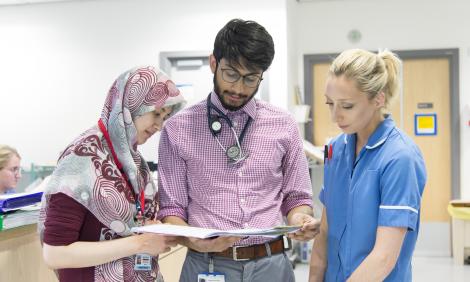Audiovestibular medicine
Doctors in audiovestibular medicine investigate, diagnose and manage hearing, balance and communication disorders in adults and children from birth onwards.
You’ll diagnose and treat hearing and balance disorders in patients of all ages, from newborn babies to older adults.
Life as a doctor in audiovestibular medicine
Every baby’s hearing is tested and those with problems will be referred to an audiovestibular doctor. It’ll be your role to explore the underlying medical condition. The tests you’ll conduct include genetic and blood tests, CT and MRI scans.Equally, you’ll see adults with hearing loss and will investigate the underlying medical problems, which can be wide-ranging and include immunological problems.
While you can specialise in different aspects of audiovestibular medicine, given the broad range of illnesses you’ll treat, you’ll need to focus on integrated patient care and work closely with colleagues as part of a multidisciplinary team. Your approach will combine clinical information with counselling and rehabilitation methodologies. Audiovestibular disorders you’ll treat include:- inherited (genetic)
- infectious
- inflammatory
- vascular (relating to the blood vessels)
- traumatic (following a wound or injury)
- metabolic (relating to the range of biochemical processes that occur in the body)
- neurodegenerative (nervous system dysfunction)
- clinical and neuro-otological examination, which might include tests to evaluate a patient’s balance
- measurement of audiovestibular function i.e. relating to the auditory functions of the ear
- investigations, including radiological imaging and a variety of blood and urine tests
- assessment for suitability for hearing aids and cochlear implants
- treatment of infection, autoimmune disorders (diseases where the body’s immune system attacks its own tissues), and peripheral vestibular dysfunction (i.e. dysfunction of the balance organs of the inner ear). This could be through pharmaceutical products, repositioning manoeuvres and physiotherapy involving relevant professionals
The care you deliver can considerably improve the quality of life for a patient and make your role incredibly rewarding.
How much can I earn?
You’ll first earn a salary when you start your foundation training after medical school. Find out details of current salary ranges for foundation and specialty training, SAS doctors and consultants on the 'Pay for doctors' page.How about the benefits?
- make a difference
- flexible and part-time working
- high income early in your career
- work anywhere in the world
- excellent pension scheme
- good holiday entitlement
- NHS discounts in shops and restaurants
Must-have skills
- excellent communication skills to manage a wide range of relationships with colleagues, and patients and their families
- emotional resilience, a calm temperament and the ability to work well under pressure
- teamwork and the capacity to lead multidisciplinary teams
- problem-solving and diagnostic skills
- outstanding organisational ability and effective decision-making skills
- first-class time and resource management for the benefit of patients
In addition, doctors in audiovestibular medicine need to demonstrate:
- an interest in keeping up to date in audiovestibular clinical practice and contributing to research and training
- the ability to interact well with patients who may have communication difficulties, emotional problems and long-term conditions
- administrative and organisational skills
Entry requirements
Your first step is medical school. Typically, you’ll need excellent GCSEs and three A or A* passes at A level including chemistry for a five-year undergraduate degree in medicine. Many medical schools also ask for biology and others may require maths or physics.If you already have a degree, you could study for a four-year postgraduate degree in medicine.
You’ll need to pass an interview and admissions test. You’ll be asked to show how you demonstrate the NHS values such as compassion and respect.Some medical schools look to recruit a mix of students from different backgrounds and geographical areas, so your educational and economic background and family circumstances could be considered as part of your application.
What are my chances of starting a career in audiovestibular medicine?
In 2021, there were 38 consultants in audiovestibular medicine in the NHS in England. In addition, there were 12 applications for four training places.How to become a doctor in audiovestibular medicine
After medical school, you’ll join the paid two-year foundation programme where you’ll work in six placements in different settings.After your foundation programme, you can apply for paid specialty training to become a doctor in audiovestibular medicine, which will take a minimum of six years.
You may be able to train part time, for example for health reasons or if you have family or caring responsibilities.Where a career as a doctor in audiovestibular medicine can take you
You could:- specialise or conduct research
- teach medical students or postgraduate students in training
- get involved in research at universities, the NHS or private sector
-
These organisations have further information about being a doctor in audiovestibular medicine, particularly as your career progresses. Take a look.
Royal College of Physicians of Edinburgh
Royal College of Physicians and Surgeons of Glasgow
The British Association of Audiovestibular Physicians
Joint Royal Colleges of Physicians Training Board
And hear from people working as an audiovestibular doctor:





